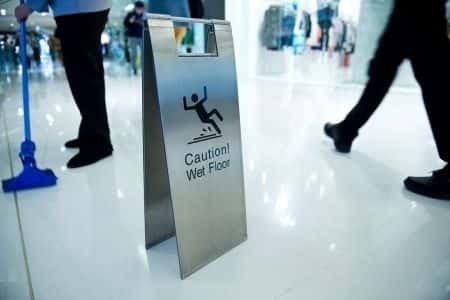Slip and Fall in Transit Station Results in a Torn Meniscus
Updated on
This case involves a slip and fall on the stairs. At a mass transit station in an urban area, the plaintiff was buying a monthly train ticket since he commuted to and from work daily. The stairs in the station all had treads to prevent slippage, but the steps leading up to the ticket booth were especially worn due to the high rate of foot traffic. It was a snowy day, and there was some slush from people’s footwear on the stairs, blocking the view of the worn treads as well as increasing the chance of slippage. While approaching the ticket booth, the plaintiff slipped and tore his meniscus. It was later revealed that the plaintiff also sustained a concussion. As a result, the plaintiff had to miss five months of work.
Question(s) For Expert Witness
1. What are the measures that should be taken to prevent slips on stairs in a high traffic area like a transit station?
Expert Witness Response
![]() There are several measures that the station’s managers should take to prevent slip and falls on stairs. It is important to place and maintain non-skid treads on stairs, especially those made of potentially slippery materials like polished wood or stone. Naturally, these strips are worn-down over time, so they should be inspected and replaced once their traction is compromised. Treads wear out over a long period of use, so the steps were likely left dangerous for quite some time. The stairs should also be maintained to avoid buildup of water or slush. Since this took place in a particularly high traffic zone, the workers cleaning up the wet floors should have monitored and taken care of the area in question (regular maintenance and a warning sign when the floors became slippery). The manager(s) of the station should have an established procedure for examining and cleaning or repairing the premises. By reviewing these procedures, the adequacy of the station's planning, as well as the implementation of this strategy, can be reviewed.
There are several measures that the station’s managers should take to prevent slip and falls on stairs. It is important to place and maintain non-skid treads on stairs, especially those made of potentially slippery materials like polished wood or stone. Naturally, these strips are worn-down over time, so they should be inspected and replaced once their traction is compromised. Treads wear out over a long period of use, so the steps were likely left dangerous for quite some time. The stairs should also be maintained to avoid buildup of water or slush. Since this took place in a particularly high traffic zone, the workers cleaning up the wet floors should have monitored and taken care of the area in question (regular maintenance and a warning sign when the floors became slippery). The manager(s) of the station should have an established procedure for examining and cleaning or repairing the premises. By reviewing these procedures, the adequacy of the station's planning, as well as the implementation of this strategy, can be reviewed.
Subscribe to our newsletter
Join our newsletter to stay up to date on legal news, insights and product updates from Expert Institute.
Sign up nowFind an expert witness near you
What State is your case in?
Subscribe to our newsletter
Join our newsletter to stay up to date on legal news, insights and product updates from Expert Institute.


